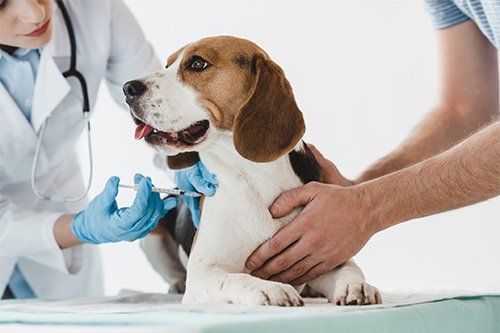Get Your Dog These Important Vaccines

Just as vaccines play an important role in preventative medicine for people, they're also integral to preventative veterinary care for dogs. If you have a canine pet or work dog, here are some of the most commonly needed vaccines and when they're needed.
Rabies Vaccine
Rabies is perhaps the most important of all canine vaccines, for it prevents a deadly disease that has no cure. Not only is the disease dangerous for a dog but also usually fatal in people. While a few people have survived, those are the exceptions rather than the norm. No proven treatment plan works reliably. Additionally, most states and counties require dogs to have a rabies vaccination by law. If you don't vaccinate your dog at the appropriate time, you probably won't be able to register them with your local government office. You also could face serious consequences if they ever contracted the disease and infected someone. Rabies vaccines are administered to dogs in one-year and three-year shots. Puppies initially receive a one-year vaccine, but after that, your vet might recommend either the one- or three-year option. State laws regulate when the shot is first given. In Florida, dogs must be vaccinated at four months of age.
Distemper Vaccine
The distemper vaccine is another standard vaccine that protects against a neurological disease. Canine distemper is a serious disease that causes multiple health problems in dogs, the most serious of which is lasting brain damage. The disease spreads via airborne viruses, so you can't fully protect your dog from contracting it when in public unless they're vaccinated. The distemper vaccine is a series of shots that begin during a puppy's first few months of life. The vet spaces out the first and second doses a few weeks apart, and gives the third around one year of age. After this final shot, a booster is needed every three years. If you purchase a puppy from a breeder, the dog might already have one or two of the initial distemper shots depending on the age at which you acquire the puppy. Make sure to request complete veterinary records so that you know the dog's shot history and can complete this course of vaccination appropriately.
Parvovirus Vaccine
The canine parvovirus is a treatable disease of the digestive tract, but it is serious and can be fatal if untreated. Additionally, it causes vomiting and diarrhea that can be particularly problematic if a dog is suffering from other health issues at the same time as when they contract this disease. Because the disease is potentially deadly, the parvo vaccine is a standard vaccination. It's on a schedule similar to distemper, with two doses early on that are followed by a third at one year of age. The dog receives a booster every three years thereafter. In many cases, parvo and distemper shots are administered during the same appointment and even within the same shot. Preventing the diseases with a single dose reduces the number of shots a dog needs to receive, and this often results in cost savings for the owner.
Adenovirus Vaccine
Two versions of the adenovirus exist, called type 1 and type 2. Type 1 is commonly known as canine hepatitis, and type 2 is sometimes called kennel cough. Canine hepatitis can lead to liver damage and death, so the type 1 vaccination is a standard. Most boarders require kennel cough, so you'll need it if you want to leave your dog overnight. If you don't plan on using a boarder, however, you might not need this vaccine. Kennel cough is highly contagious, but less serious and treatable. To get your dog the vaccines it needs, make an appointment at Pet Medical Center of Vero Beach.





